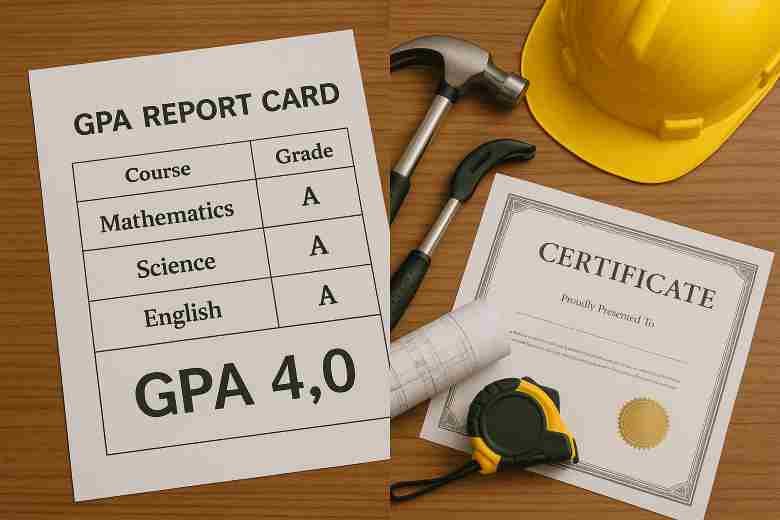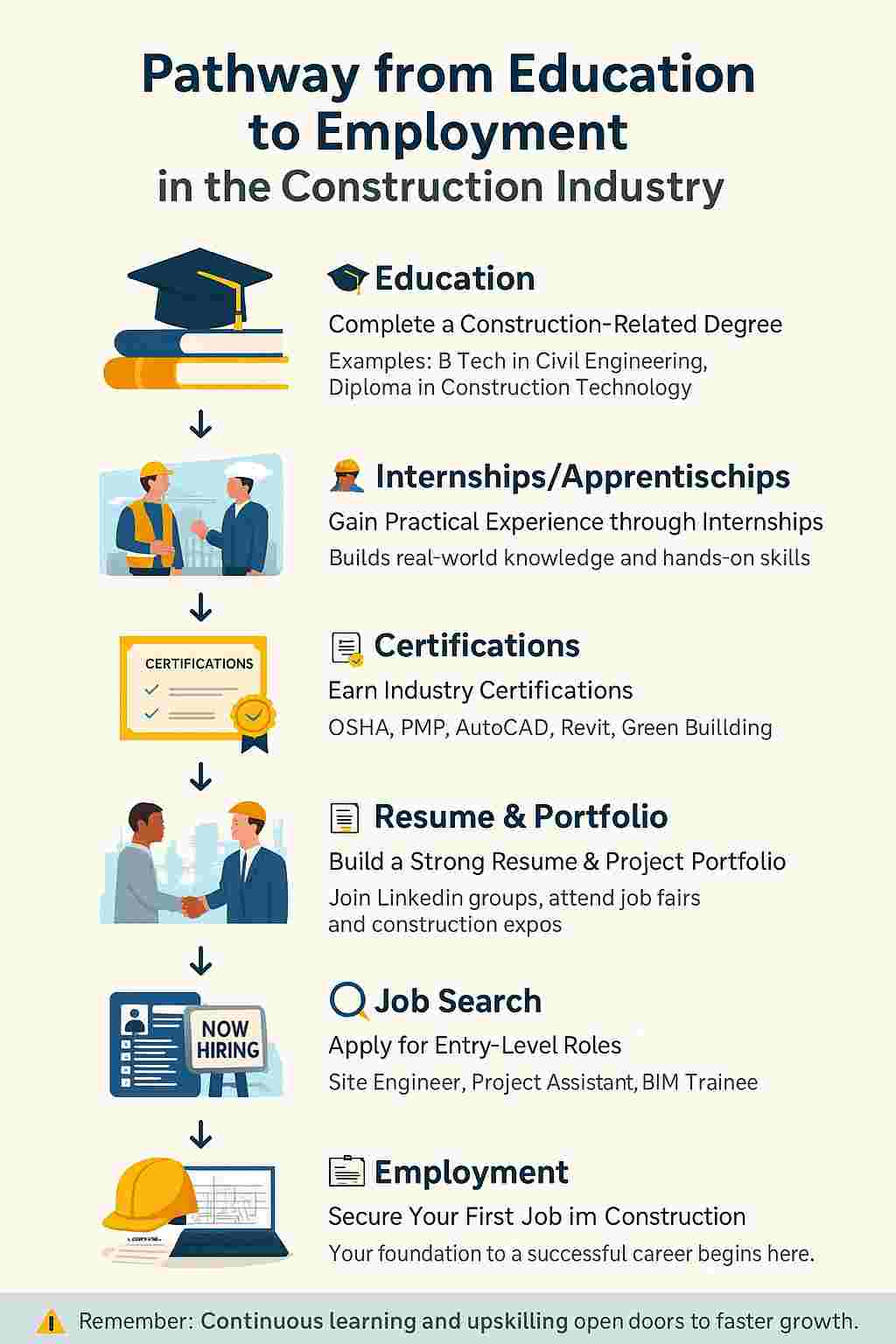Last Updated on April 23, 2025 by Admin
In today’s construction job market, college marks play a role, but they are far from the only factor determining your success. Early in your career, a strong GPA can help you stand out in large applicant pools and meet basic screening criteria. However, practical experience, soft skills, and industry certifications quickly eclipse academic performance as you progress in the field. Recruiters now prioritize hands-on assessments, real-world problem solving, and cultural fit over transcript numbers, with many organizations dropping GPA requirements altogether to boost diversity and focus on performance potential. For students with average grades, building a compelling portfolio, networking effectively, and continually upskilling can open doors that grades alone cannot. Below, you’ll find an in-depth guide—complete with recent data, expert insights, and actionable strategies—to help you navigate the construction hiring landscape and land your dream role, regardless of your GPA.
ConstructionCareerHub App is LIVE — built ONLY for construction careers. Don’t apply with a weak resume.
Get ATS-ready Resume Lab + Interview Copilot + Campus Placement Prep (resume screening, skill gaps, interview readiness) — in minutes & Other advanced features.
Explore Smarter Construction Career Tools →Quick check. Big impact. Start now.
Table of Contents
The Big Question
If you’re a student with average grades in civil engineering, construction management, or a related field, you may wonder:
Do college marks really matter when getting a job in construction?
The short answer is: Yes, but only to a limited extent—and primarily at the very start of your career. Grades can help you get in the door, but they won’t keep you there. Recruiters in construction increasingly look beyond transcripts to gauge your readiness for the job site.
In this guide, we’ll explore:
- When and why GPA matters versus when it doesn’t
- What construction recruiters truly value—from on-site skills to teamwork
- Data and statistics on GPA screening and job placement
- Real recruiter feedback on screening practices and diversity impacts
- Strategies for students with average grades to boost employability
- Case studies of professionals who succeeded despite modest GPAs
- Actionable steps to build a competitive profile
Let’s dig in.
Understanding the Role of College Marks
When Do Grades Matter?
Initial Applicant Screening
Many firms—especially large contractors and engineering consultancies—use GPA thresholds (often around 3.0/4.0) to filter high volumes of candidates for internships and entry-level roles.
Graduate Programs & Scholarships
Competitive graduate schemes and scholarships often stipulate minimum GPAs as eligibility criteria, making academic performance more critical if you plan to pursue advanced study.
Licensure and Accreditation
Certain professional licences and industry accreditations may require academic transcripts, particularly for civil engineers and construction managers seeking state licensure.
When Grades Matter Less
Hands-On Experience Becomes King
After securing your first role, recruiters focus on what you can do, not what you scored on exams. Practical experience—internships, apprenticeships, and on-site projects—drives promotion and career growth.
Skills-Based Hiring Trends
An industry shift toward skills-based hiring means employers assess candidates on real-world tasks (e.g., mock project plans, safety audits) rather than degree prestige or GPA alone.
Soft Skills & Cultural Fit
Qualities like communication, problem-solving, and teamwork are difficult to measure via transcripts but essential for site-based roles. Recruiters often say these traits outweigh academic performance.

How Recruiters in Construction Evaluate Candidates
Practical Experience Over GPA
Internships & Apprenticeships
“Experience trumps grades.” A survey found that internships, part-time jobs, and volunteer work rank higher than GPA for hiring managers.
On-Site Assessments
Many companies now use hands-on tests and real-work simulations to evaluate skills under pressure—far better predictors of performance than GPA.
Soft Skills and Cultural Fit
Teamwork & Communication
Interpersonal skills and the ability to work in dynamic teams as key for construction laborers and managers alike.
Problem-Solving & Adaptability
Recruiters look for candidates who can adapt to unexpected challenges on-site and troubleshoot issues quickly—skills not reflected in academic transcripts.
Certifications and Continuous Learning
-
Industry Certifications
Holding certifications such as OSHA Safety, CPR/First Aid, or software-specific credentials (e.g., Revit, Navisworks) enhances your profile, signaling commitment to best practices . -
Continuous Education
Engaging in online courses (LinkedIn Learning, Coursera) and attending workshops shows recruiters you’re proactive about skill development Investopedia.
Portfolio and Projects
-
Project Showcases
A well-curated portfolio—photographs, blueprints, site reports—can demonstrate your capabilities far more effectively than a transcript alone . -
Technical Demonstrations
Presentations of BIM models, cost estimates, or project plans during interviews help recruiters assess your real-world skills.
Data and Statistics on GPA and Job Placement
-
GPA Screening Trends
SHRM reports that 80% of companies once had GPA cut-offs but now less than 20% maintain them—driven by data showing GPA poorly correlates with job performance and impedes diversity goals SHRM. -
Education vs Experience Value
Investopedia finds that in vocational fields like construction, experience often outweighs education, whereas high-tech roles may still favour recent degrees Investopedia. -
On-The-Job Training Prevalence
BLS data: 74.1% of construction/extraction roles require on-the-job training, while only 57.0% need formal credentials—and many of those are high school diplomas Bureau of Labor Statistics. -
Diversity Impact
Companies that drop GPA requirements see greater representation of Black and Hispanic candidates—key to building equitable hiring pipelines SHRM.
Strategies for Students with Average Grades
1. Gain Practical Experience
-
Internships & Co-ops
Aim for at least 2–3 internships during your degree to gain exposure to real-world workflows and build professional references . -
Apprenticeships
Join trade apprenticeship programs (e.g., plumbing, electrical, carpentry) to earn while you learn and establish industry contacts Bureau of Labor Statistics.
2. Develop a Strong Portfolio
-
Documentation
Keep detailed records—photos, CAD files, cost sheets—of your class projects, site visits, and volunteer builds . -
Online Presence
Create a personal website or LinkedIn project gallery to showcase your work and make it easily accessible to recruiters Investopedia.
3. Network Within the Industry
-
Professional Organizations
Join bodies like the American Society of Civil Engineers (ASCE) or Construction Management Association of America (CMAA) and attend local events Bureau of Labor Statistics. -
LinkedIn Engagement
Connect with site managers, recruiters, and alumni; share insights and ask thoughtful questions to build your reputation Investopedia.
4. Focus on Skill Development
-
Workshops & Bootcamps
Attend short-term training on project management, BIM software, or sustainability practices to add in-demand hard skills Investopedia. -
Certifications
Obtain OSHA 10/30, LEED Green Associate, Certified Construction Manager (CCM), etc., to demonstrate expertise and dedication .
5. Leverage Internships and Apprenticeships
-
Rotational Programs
Pursue structured graduate or intern rotations—many large firms offer 12–24 month placements across multiple departments to build a broad skill set Job Search | Indeed. -
Mentorship
Seek mentors who can guide your career development, provide references, and expose you to leadership opportunities .
6. Continuous Learning and Certifications
-
Online Courses
Platforms like Coursera and Udemy offer construction-specific courses—e.g., Primavera scheduling, cost estimation—often with certificates upon completion Investopedia. -
Professional Development
Attend conferences (e.g., ENR FutureTech, World of Modular) to stay abreast of trends and meet industry innovators Bureau of Labor Statistics.
Case Studies: Success Stories Beyond GPA
Case Study 1: From 2.8 to Project Lead
Background: Graduated with a 2.8 GPA in Civil Engineering.
Strategy: Secured two internships, built a BIM portfolio, earned OSHA and LEED certifications, and joined ASCE.
Outcome: Hired as a site engineer; promoted to Project Lead within three years based on strong leadership and technical performance.
Case Study 2: Trade Apprentice to Site Manager
Background: No college degree; started as a carpentry apprentice.
Strategy: Completed Carpentry and Plumbing apprenticeships, earned OSHA 30 certification, and networked via union events.
Outcome: Transitioned to Foreman and then Site Manager for multimillion-dollar residential projects, displaying leadership and technical mastery.
Case Study 3: Bootcamp Graduate in Construction Tech
Background: GPA 3.0; digital twin enthusiast.
Strategy: Completed a digital twin bootcamp, built AR/VR safety demo, presented at a regional safety conference.
Outcome: Recruited by a smart-construction startup as a BIM & Digital Twin Specialist, showcasing the value of niche technical skills.
Actionable Steps to Enhance Employability
-
Audit Your Profile: List all hands-on experiences, skills, and certifications; identify gaps.
-
Set SMART Goals: Specific, Measurable, Achievable, Relevant, Time-bound targets for next 6–12 months.
-
Build a 12-Month Roadmap:
-
Months 1–3: Secure one internship and finish an OSHA certification.
-
Months 4–6: Develop a project portfolio website.
-
Months 7–9: Attend two industry events and join a professional society.
-
Months 10–12: Complete a specialized bootcamp (e.g., digital twin) and apply for rotational graduate programs.
-
-
Engage Mentors: Reach out to 3–5 industry professionals for regular guidance.
-
Practice Interview Simulations: Include technical case studies and soft-skill scenarios.
-
Monitor Progress: Update your roadmap and portfolio quarterly; adjust based on feedback.

Conclusion: Your Path Forward
College marks can open doors early on, but they do not define your long-term potential in construction. Emphasize real-world experience, continuously upskill, and showcase your talents through hands-on assessments and a dynamic portfolio. By following the strategies outlined here, grounded in data, recruiter feedback, and industry trends, you can build a rewarding construction career regardless of your GPA.
Remember:
“A 3.2 GPA can get you an interview, but it’s your hands-on skills, adaptability, and drive that will earn you the job—and the promotion.”
Start applying these insights today, and watch your career take shape—well beyond the classroom.
Related Posts:
- The Ultimate Guide to LinkedIn Search: Tips, Tricks, and Advanced Techniques
- How to use Google for job search effectively [2025 Updated Guide]
- A Comprehensive Guide to Civil Engineering and Interior Design
- LinkedIn Jobs Search Guide | How to find jobs on LinkedIn in 2025?


